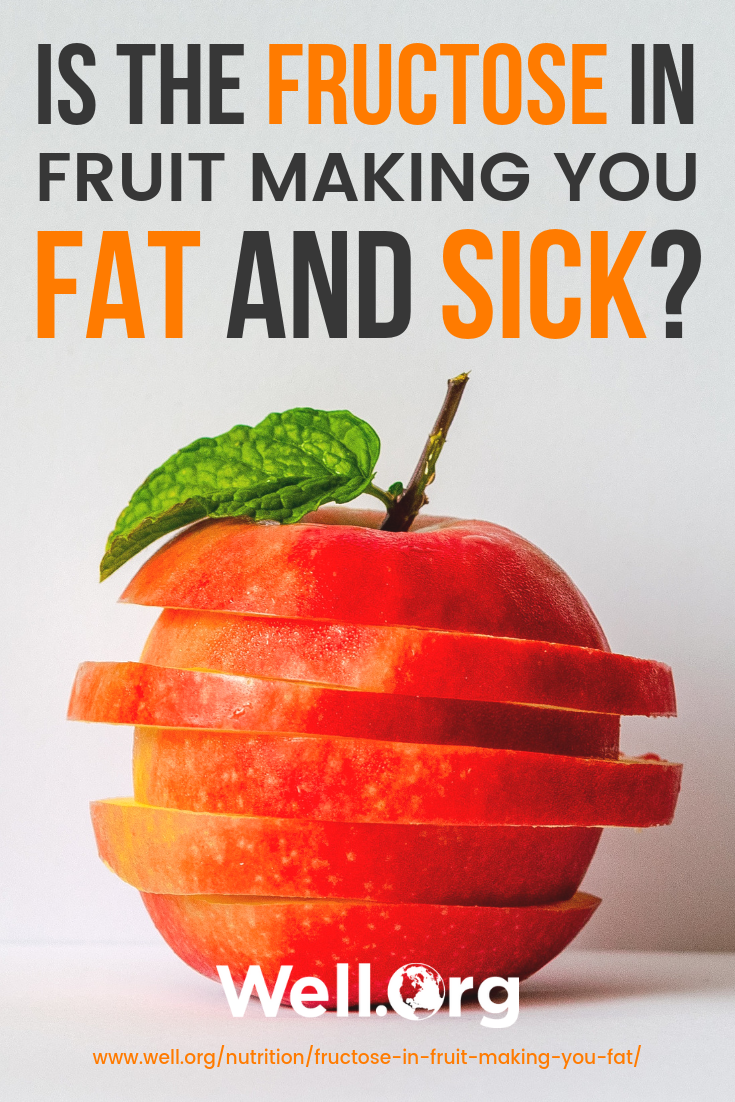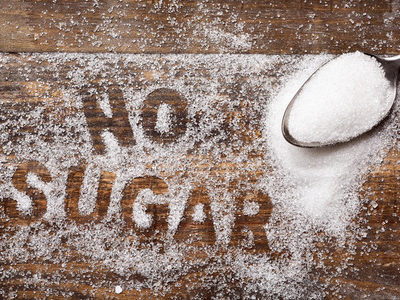Table of Contents[Hide][Show]
4 Tips to Stop Asking “Will Fruit Make You Fat?”+−
- 1. Eat According to Your Health Condition
- 2. Go Beyond the Sugar Content of Fruits
- 3. Make Plant-Based Diet a Lifestyle
- 4. Know the Dietary Guidelines
- Does Fruit Make You Fat? Yes, to an Extent
- Curbing Junk Food Habits: How to Stop Craving Late Night Sugar and Chips
- Tips To Follow A No-Sugar Diet, Just Say No To Sugar
- A Sweet Countdown – Sweeteners And Sugar Alternatives Ranked From Best To Worst!
Does fruit make you fat and even sick? Read on to find out how fructose levels in fruit can affect your health.
What You Need to Know About Fructose in Weight Loss
Anyone who’s trying to lose the weight may end up asking, “does fruit make you fat?”
Did you know that fructose in fruits can contribute to weight gain? Find out how fruit sugar can hold you back from achieving your body goals.
Are you trying to lose weight and finding it difficult? Have you turned to juice fasting and cleansing but disappointed with the results?
Well, you might be surprised to learn that all of the fruits you’re eating may be the issue. Fruits are usually considered healthy foods.
While that’s true to a certain extent, too much fruit can be problematic. Funnily enough, when people try to lose weight, they often consume more fruit or fresh fruit juice, only to find themselves gaining weight rather than losing it.
But fruit is a natural whole-food source, isn’t it? That’s true, but it also contains a lot of fructose, which is the main form of sugar found in fruits.
Is the fructose in fruits bad for you? It isn’t healthy to consume any form of sugar in high amounts, especially if it’s fructose.
Fruits Are Full of Fructose
Take a look at the fructose content in these fruits as an example:
- 1 apple – 10.74 g
- A medium banana – 5.92 g
- 1 cup grapes – 12.28 g
- 1 mango – 15.72 g
If you’re going to eat something sweet, fruits are definitely the best type of natural sugar to pick. It’s got fiber, polyphenols, and beneficial compounds that aid digestion.
Polyphenols Definition: These are micronutrients found mostly in whole foods, such as fruits and vegetables, which provide antioxidant effects in the body.
It contains a natural supply of vitamins and minerals, too. When it comes to fruit or fruit juice, always choose to eat the whole fruit.
RELATED: Tips To Follow A No-Sugar Diet | Just Say No To Sugar
Don’t Let Fruit Juice Fool You
Another common misconception is juicing is a way to achieve better health. Many people do it because they think it’s a great way to lose weight or cleanse.
Again, this is not the case, especially if your juice contains two or three pieces of fruit. Don’t be fooled into thinking homemade juice is any better either.
The reality is when you juice a fruit, you decrease its fiber and nutrient content and increase the calories and sugar/fructose content.
For example:
- 1 whole apple has 70 g calories, 19 g carbohydrates, 3 g fiber, 14 g sugar
- 1 cup homemade apple juice has 120 calories, 30 g carbohydrates, 0 g fiber, 28 g sugar
Now that’s a big difference, right? By juicing the fruit, you instantly double your calories and sugar/fructose intake.
When it comes down to it, too much fruit or fruit juice can cause weight gain and have other harmful effects. It also makes it difficult to overcome metabolic problems like:
- Diabetes
- Obesity
- Insulin resistance
- Fatty liver
- Other forms of liver damage, blood pressure, and cholesterol
…and it’s all because of the fructose.
The Unique Metabolism of Fructose
There are different types of sugars. You’ve probably heard of some of them:
- Glucose
- Lactose
- Sucrose
- Fructose
Because fructose does not require insulin like the other forms of simple sugar, researchers first thought it may be the solution to curing diabetes and metabolic issues. Unfortunately, it turned out the opposite is true.
Fructose is a unique type of sugar because it gets metabolized entirely by the liver.
Let’s compare glucose and fructose, so you get a clearer picture of how this works.
When we eat glucose in something like brown rice, our body absorbs it from the digestive tract and converts that glucose into energy we can use.
The body also stores some of it for later use as glycogen in the muscles and liver. Then our glycogen stores break it down to glucose when we need it for energy.
Fructose, on the other hand, is poorly absorbed in the digestive tract and does not get used as energy.
Our body doesn’t have the ability to transport fructose into the cells as it does with glucose. Instead, the liver processes it and stores the fructose as fat.
If I were to eat 120 calories of glucose, just 1 calorie is converted to fat. If I eat 120 calories of fructose, 40 calories are converted to fat.
All fat cells need a backbone to be created. That backbone is called a triglyceride.
Guess what helps to make them rapidly? Fructose.
How Fructose from Fruit Can Contribute to Metabolic Syndrome
Metabolic Syndrome Definition: A group of symptoms that raises the risks of chronic diseases like heart disease and diabetes.
High consumption of fructose also promotes fat in the liver. In turn, it promotes insulin resistance and high cholesterol (the bad kind we don’t want).
These metabolic issues are signs of prediabetes and an increased risk of getting type 2 diabetes. To top it off, eating too much fructose also affects your hunger and appetite signals.
It literally bypasses important regulatory mechanisms in the brain that help us control energy balance and metabolism. You’re likely to eat more and still feel hungry when you eat too much fructose.

4 Tips to Stop Asking “Will Fruit Make You Fat?”
Questions like “Does fruit make you fat?” or “Can fruit make you gain weight?” can cast a dark shadow on these types of produce.
Some people may need to reduce their consumption of fruits with fructose that are too high. Others may avoid them when they’re fructose intolerant, but all these don’t mean fruits are bad.
As mentioned, besides fructose, you get nutrients such as fiber, vitamins, minerals, as well as fatty acids.
Here are the best tips when you want to stop asking “Does fruit make you fat?” and eat an apple instead:
1. Eat According to Your Health Condition
If you’re suffering from heart disease or you have high cholesterol levels or blood sugar levels, the doctor may have some ideas on fruit consumption.
For example, if you are suffering from diabetes, you can still eat up to 15 grams of carbohydrates from fruit. When it comes to servings of fruit, that is up to a cup.
The amount of fructose in fruits in this situation is not a problem. It raises your blood sugar levels the same way if you don’t eat them.
Contrary to popular belief, there’s no “right time” to eat fruits. Whether you consume them in the morning or afternoon, the rise of your glucose may still be the same depending on the fruits you eat.
2. Go Beyond the Sugar Content of Fruits
When people ask, “Does fruit make you fat?” they’re actually putting all of the types in one basket. In reality, fruits are never equal.
In fact, it is necessary to go beyond the number of calories or sugar content fruits have. You may also want to consider factors such as glycemic index and glycemic load.
- Glycemic index (GI) assigns a numerical value on foods such as fruits with simple sugar or glucose having a value of 100. It is an indicator of how fast blood sugar levels increase when you eat them.
- Glycemic load (GL) measures the number of carbohydrates the servings of fruit contain.
The reference ranges are:
- For GI, 55 and below is low, 56 to 69 is moderate, while 70 and above is high.
- For GL, 0 to 10 is low, 11 to 19 is moderate, and 20 and above is high.
What fruits are high in fructose? These include:
- Dried fruit
- Apple
- Bananas
- Mangoes
- Watermelon
- Pineapple
- Berries
If the answer to “Can you gain weight from fruit?” was a big yes, you may then avoid these altogether. The scenario changes, however, once you factor in GI and GL.
For instance, an apple has a GI of only 38 and a GL of 5. In other words, not only is it low in glycemic index, but a serving of it contains very low carbohydrates.
In general, eating fruit as long as it’s in moderation usually doesn’t have a significant effect on your glycemic index or load because of its sugar fructose. Plus, you get some vitamin from the fruit.
That’s a contrast to the consumption of refined sugar from sugary drinks like soft drinks or foods such as ice cream.
3. Make Plant-Based Diet a Lifestyle
Another way to eat fruit into your meal and stop asking “Does fruit make you fat?” is to follow a plant-based diet. It means about 80% of the food you eat is from plants:
- A variety of beans
- Healthy grains such as quinoa
- Lots of green vegetables including Alkalizing Greens
- Moderate amounts of fruits
- Seeds and nuts
- Minimally processed foods such as dried fruit
A plant-based diet doesn’t have to mean going vegan or vegetarian. You can still eat meat rarely, and you pick high-quality ones like grass-fed beef.
You may also get inspiration from veterans in a plant-based diet such as Freelee the Banana Girl. She maintains a YouTube channel where you can view some healthy recipes.
Well.Org also has some easy-to-follow green smoothie recipes you can try. Many of these contain some amounts of fruit and a lot of green veggies, so you can stop depending too much on orange juice.
These types of food have significant amounts of fiber, which further slows down the absorption of sugar like fructose. They are also high in antioxidants, vitamins, minerals, and even good fats.
4. Know the Dietary Guidelines
Corresponding health authorities in the U.S. government need to issue a report every five years. It contains the state of health of the people, as well as recommendations for dietary guidelines.
For now, the key recommendations include:
- Consumption of a variety of vegetables from all subgroups (rainbow colors)
- Whole fruits
- Fat-free or low-fat dairy
- Varied protein foods
- Healthy oils and grains
The report also suggests cutting back or avoiding foods high in added sugars, sodium, and saturated fats. You also need to focus not only on the amount and calories but also on nutrient density and variety.
Does Fruit Make You Fat? Yes, to an Extent
When it comes to answering “Does fruit make you fat?”, this is just the tip of the iceberg. More and more research is being done to look into the effects of fructose on our body.
We’re bound to see more evidence pointing to its negative impact on our health.
It’s true that the main forms of fructose contributing to metabolic issues are things like high-fructose corn syrup, sugar (which is 50% glucose/50% fructose), and other forms of added sugars. Most of these aren’t natural.
If you do have any type of metabolic problem or you’re struggling to lose weight, then don’t exclude fruit consumption as part of the issue. Cutting it down or even cutting it out for a while might just help your body in more ways than you can imagine.
Although fruits are rich in fructose, you can still add them to your diet if you consume them in moderate or minimum amounts. If you are unsure of how many fruits to eat or which types you should eat, it is best to consult your dietician for medical advice and the right dietary guidelines you should follow.
You May Also Like…
Editor’s Note: This post was originally published on July 14, 2014, and has been updated for quality and relevancy most recently on April 7, 2021.




